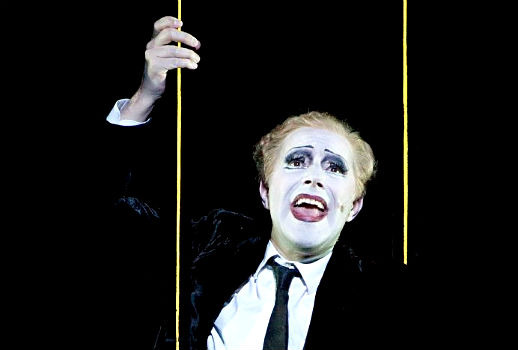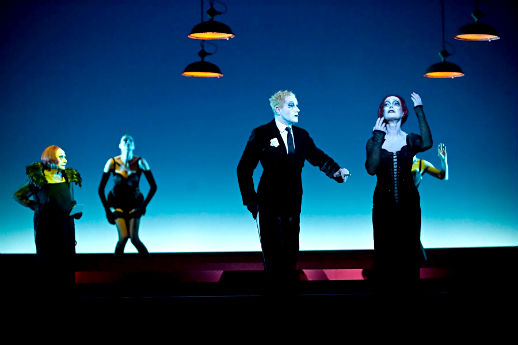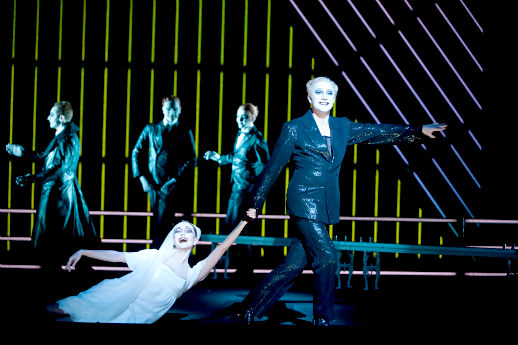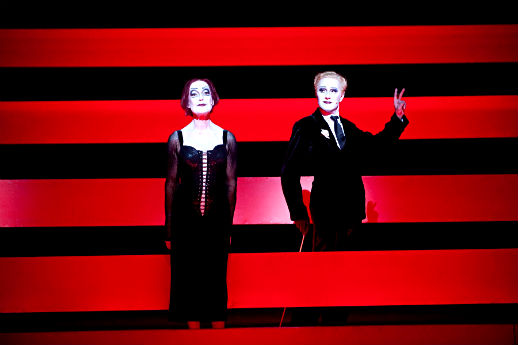

Not only is Macheath back in town, but so is Robert Wilson, long America’s most notorious purveyor of regietheater, whose re-imagining of the Kurt Weill–Bertolt Brecht masterpiece arrived last week at the Brooklyn Academy of Music’s Opera House.
The worldwide Wilsonmachine keeps chugging away; one finds posted, with no apparent irony, on a calendar ticking off the many Wilson productions scheduled for 2011:
- September 19, 2011: Robert Wilson’s 70th Birthday in Milan
- September 21, 2011: Robert Wilson’s 70th Birthday in Brazil (São Paulo)
- September 23, 2011: Robert Wilson’s 70th Birthday in Brazil (Porto Allegra)
- September 29, 2011: Robert Wilson’s 70th Birthday in Berlin
- October 4, 2011: Robert Wilson’s 70th Birthday in New York
How fitting though that the actual birthday (4 October 1941) was celebrated in New York–the city that hosted so many of his earliest works including Einstein on the Beach, his collaboration with Philip Glass, which had its first American performance at the Metropolitan Opera House in November 1976—at BAM where 15 Wilson productions have been seen over the decades. My first Wilson-encounter and first visit to BAM was the 1984 revival of Einstein which I remember as an astonishing, revelatory experience. It will be interesting to revisit that production nearly thirty years later when Einstein returns to BAM in September 2012.
Since 1984, I’ve seen nearly a dozen Wilson productions although only two were of what could be called traditional opera: Gluck’s Alceste at the Lyric Opera of Chicago with Jessye Norman (who has frequently worked with Wilson) and, of course, his hotly debated Met Lohengrin. After that first Einstein, the most memorable was the most intimate: a staging of Heiner Müller’s Hamletmachine in which Wilson transformed a six-page text into a dazzling two hour show staged in a tiny theater at New York University using NYU acting students—proving Wilson is at his best when he’s creating, rather than recreating, a work.
Wilson claims (as reported in an essay in the September BAM program) that he had little knowledge of Brecht and his “epic theater” until the late 1970s, surprising since Brecht’s performance theories including his concept of the Verfremdungseffekt (“alienation effect”) seem to perfectly dovetail with the Wilson aesthetic of anti-realistic, anti-psychological stylization. Wilson has since done five productions (including this one) for the Berliner Ensemble which Brecht founded in 1949 inEast Berlin and which now performs at the Theater am Schiffbauerdamm where Die Dreigroschenoper premiered in 1928.
Exactly two hundred years earlier, at the height of the popularity of Italian opera in England, John Gay and John Christopher Pepusch produced The Beggar’s Opera, a ballad-opera with spoken dialogue satirizing the prevailing art form which usually revolved around the romantic and political entanglements of noble characters, as found in the many libretti by Pietro Metastasio. Instead, Gay’s work featured the thief, murderer and pimp Macheath and his numerous wives, whores and henchmen. Although Handel’s own “Opera of the Nobility” was still a few years away, this opera of beggars which premiered in 1728 was the beginning of the death knell for opera seria in England.
Eschewing arias by visiting Continental composers, Pepusch arranged sixty-nine musical numbers using popular songs of the day, songs that the audience would immediately recognize even when set to Gay’s new texts. Editions of the work show the name of song whose melody is used printed above Gay’s lyrics. Even a snippet of Handel (his march from Rinaldo) was sneaked in for a chorus. The many songs stop to comment on the action rather than moving along the plot (a strategy that will prove particularly attractive to Brecht and Weill centuries later.)
Gay’s text is quite devastating in lampooning the political and social mores of the time. For example, witness this shocking exchange between Mr. Peachum (a man who deals stolen goods yet nevertheless sees himself as better than the thieves and whores around him) and his equally hypocritical wife upon learning that their daughter Polly has married the even more disreputable Macheath:
Mrs. Peachum: You baggage, you hussy! You inconsiderate jade! Had you been hanged, it would not have vexed me, for that might have been your misfortune; but to do such a mad thing by choice! The wench is married, husband.
Peachum: Parting with him! Why, that is the whole scheme and intention of all marriage articles. The comfortable estate of widowhood is the only hope that keeps up a wife’s spirits. Where is the woman who would scruple to be a wife, if she had it in her power to be a widow whenever she pleased? If you have any views of this sort, Polly, I shall think the match not so very unreasonable.
The Beggar’s Opera was revived in 1920 in Londonand its enormous success there caught the attention of Brecht who enlisted the aid of his mistress Elisabeth Hauptmann to do an English translation. At that point Brecht was approached by Ernst-Josef Aufricht with a commission to open his newly purchased Theater am Schiffbauerdamm. Brecht had recently worked with Kurt Weill on Das Kleine Mahogonny so, rather than use the Pepusch arrangements, new music would be composed.
A favored student of Busoni, Weill had heretofore been considered a “difficult” atonal composer, but he’d grown increasingly disaffected by the prevailing taste for Wagnerian gesamtkunstwerk and so adapted superbly to a sophisticated, jazzy mode that would prove to be the key to Die Dreigroschenoper‘s immediate and worldwide success, beginning with the score’s first and most famous number: the moritat (a murder ballad performed by strolling minstrels—from mori meaning “deadly” and tat meaning “deed”) of Mackie Messer (Macheath).
I wonder how many people who’ve bobbed and swayed to the many popular versions of Mack the Knife understand that it’s a catalog of murders, arsons and rapes. Certainly this version by the divine Ella Fitzgerald suggests she’s blithely ignoring the meaning of the lyrics:
The nihilism of the libretto and its lyrics never lets up from that opening song; witness the concluding lines of the first act finale (in the Manheim/Willett translation used both for the famed 1976 Lincoln Center revival and for the surtitles at BAM):
The world is poor, and man’s a shit
And that is all there is to it.
That’s what you’re all ignoring
That’s what’s so bloody boring,
That’s why He’s got us in a trap
And why it’s all a load of crap.
Although Weill’s music rarely evokes its eighteenth century ancestor, there is a delicious jealousy duet between Mackie’s wives Polly and Lucy deriving from Gay’s similar one which in turn was meant to echo the famous rivalry between the leading sopranos of the day, Francesca Cuzzoni and Faustina Bordoni. Richard Bonynge’s souped-up recording of Gay/Pepusch’s work features his wife battling it out with another Dame, Kiri Te Kanawa:
The Weill-Brecht version is the most Baroque-y number in the score:
Die Dreigroschenoper was so popular that a film was made in 1931 by G.W. Pabst (who also directed the superb Louise Brooks silent of Wedekind’s Lulu Pandora’s Box). In fact Pabst shot German and French versions simultaneously and comparisons between the two are fascinating–both are included in the Criterion DVD release.
Although the film differs greatly from Brecht and Weill’s original (in fact, there was a lawsuit over that issue), the film is extremely valuable for featuring Lotte Lenya—Weill’s wife and definitive interpreter—in her original role as Jenny. Her “Pirate Jenny” vividly embodies the Brechtian ideal that “When an actor sings he undergoes a change of function. Nothing is more revolting than when the actor pretends not to notice that he has left the level of plain speech and started to sing… The actor must not only sing but show a man singing. His aim is not so much to bring out the emotional content of his song… but to show gestures that are so to speak the habits and usage of the body.” Compare Lenya’s flat affect in the Pabst film (made soon after Brecht’s original production) with her version of more than 30 years later (far from the reach of Brecht’s influence):
This fascinating theory of disconnection along with Brecht’s insistence that the audience not “identify” with the characters but rather sit back and learn from the play onstage (which should never be strictly representational but rather a distanced, didactic construct) would seem to point to Wilsonas a perfect person to create a new Dreigroschenoper for the 21st century.
Having enjoyed the last two works by Wilson I saw—the ravishing Indonesian epic I La Galigo at Lincoln Center Festival and Büchner’s Woyzeck at BAM, I’m disappointed to report that this eagerly awaited first visit to New York by the Berliner Ensemble dissolves into gross self-parody, a desperately unfunny compendium of many of Wilson’s worst clichés, none of which do anything to illuminate Brecht-Weill’s ferocious masterpiece.
One cringed from the very first moments when each cast member crosses the stage doing what looked like variations from Monty Python’s sketch about the Ministry of Silly Walks while Mackie, rather than the Ballad Singer, sings his own moritat. Where many of Wilson’s works prominently feature glacially slow movement, here most everyone behaves as frenetically and spastically as possible for no discernible reason.
The over-the-top acting style makes the most blatant histrionics of silent films look positively sedate by comparison. In fact, one was reminded again and again of silent films (Wilson moved the work from Victorian times to the 1920s). Macheath’s gang races around the stage like the Keystone Cops, while Mackie and Lucy evoke Charlie Chaplin and his girl, complete with the twirling cane. Tiger Brown seemed modeled on Murnau’s Nosferatu, but he wasn’t the only vampire as Mackie at one point appears to bite Polly on the neck.
The “set” is the usual Wilsonian glowing blue (or sometimes green) light while a few neon-emblazoned carts are rolled about the stage. Typically elaborate sound design is here excessive—why do so many footsteps across the stage have to be amplified quite so loudly? Brecht’s scene names and song titles are neither seen nor announced on stage (Caspar Neher’s original designs featured placards with the name of each scene and the famed 1958 recording announces each song title before it is sung.) Thus, Wilson surprisingly smoothes out the intended disjunction between speech and song, lessening any potential “alienation” effect.
As usual Wilson’s actors wear heavy white make-up (presumably to catch the light better), but here it often works against the characters. A marcelled and peroxided Mackie, instead of radiating the powerful sexual magnetism that would explain why all the women want him and are eager to save him from the predicaments he’s constantly getting into, looks like a combination of Batman’s The Joker and an aging, epicene Emcee from Cabaret, even playing one of his scenes in a see-through bustier.
The Cabaret allusion might not be accidental as the whores’ gyrations in the brothel scene look an awful lot like bad Bob Fosse. Jenny resembles an inept onnagata more than a bitter whore, and although she sings well, at 67, Angela Winkler strains dramatic credibility even more than when Lenya played the same role off-Broadway at 56. Apparently this is not an issue for Wilson as Winkler also stars in the title role of his Berliner Ensemble production of Wedekind’s Lulu.
One could, of course, make an argument that for Die Dreigroschenoper super-stylized carrying-on is appropriate. True enough, but then why are the scenes of Mackie’s final imprisonment and imminent execution played for pathos, seeming to ask for the audience’s sympathy? Of course Brecht’s “operatic” deus ex machina arrives to save Mackie (and provide him with a castle, a peerage and a pension) and effectively pulls the rug out from any possible “identification.”
But for me the pithiest comment on the entire evening occurred when Wilson dramatically (and presumably ironically) rings down a huge red curtain during the finale. However, at Thursday’s performance only the right half of the curtain fell; briefly one imagined that this might be Wilson poking fun at the big red-curtain cliché, however, the surprised looks on the cast’s faces showed it was an accident. Yet it seemed a perfect metaphor for the misfire of the whole production.
In that same essay in the BAM program, an ingenuous Wilsonremarks “I wrote her [Barbara, Brecht’s daughter] asking her what she thought, and she was very complementary, saying I had found a new way of looking at the work and ‘Papa would approve.’” Other than her being genuinely grateful for the inevitable flow of fees from a Wilson revival likely to tour widely, I wonder what Barbara Brecht-Schall really thought of this loud, manic, endless (the first act was over two hours long) revival.
However, the musical side of the evening was grand—more than once one was tempted to close one’s eyes and just listen. How thrilling to hear Weill’s music so idiomatically played by a really spiffy nine-piece band, in the pit though rather than on stage as requested by the composer. And as good as some later translations have been, the bite and crack of Brecht’s lyrics are so much more potent in German, and this cast really spit out the words although there was occasionally too much screaming
No one was a great singer per se, but then Weill didn’t intend for this music to be sung by classically trained singers. Polly loudly declaimed her reclaimed “Pirate Jenny,” but otherwise she and the rest of cast actually sang more than they spoke the music. And, although Brecht’s well-constructed libretto has some acute moments, it’s surely Weill’s spectacularly fierce music that accounts for the work’s continued popularity.
The classic 1958 Brückner-Rüggeberg recording in German with the inevitable Lenya as Jenny remains the best version.
However, the blistering Lincoln Center revival directed by Richard Foreman starring Raul Julia as Macheath and cult favorite Ellen Greene as Jenny is superb and a close second. It has recently become available again but only as an mp3 download.
It features a brutally honest and explicit translation of the lyrics, substantially rougher than the famous 1954 Off-Broadway cast recording of the Marc Blitzstein version that introduced The Threepenny Opera to most Americans. Although its Macheath sounds like he should be singing Freddie in My Fair Lady instead of a murderous criminal, the ladies, including future sitcom favorites Beatrice Arthur and Charlotte Rae—who steals the show as a brassy Mrs. Peachum, are really fine.
In addition to its Mackie, the recording really sabotaged by its phlegmatic conducting; so try to get your hands on the live “private” document of the smashing world premiere of the complete Blitzstein version from Brandeis University in 1952: it’s conducted by Leonard Bernstein!
Photos: Stephanie Berger.




























Comments